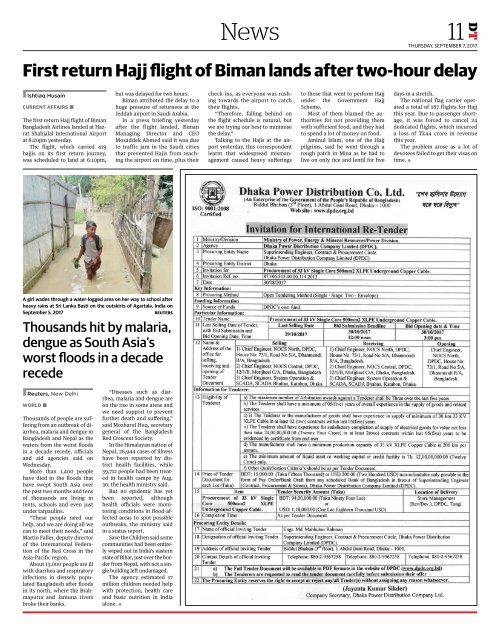e_Paper, Thursday, September 7, 2017
You also want an ePaper? Increase the reach of your titles
YUMPU automatically turns print PDFs into web optimized ePapers that Google loves.
News 11<br />
THURSDAY, SEPTEMBER 7, <strong>2017</strong><br />
First return Hajj flight of Biman lands after two-hour delay<br />
DT<br />
• Ishtiaq Husain<br />
CURRENT AFFAIRS <br />
The first return Hajj flight of Biman<br />
Bangladesh Airlines landed at Hazrat<br />
Shahjalal International Airport<br />
at 8:20pm yesterday.<br />
The flight, which carried 419<br />
hajjis on its first return journey,<br />
was scheduled to land at 6:10pm,<br />
but was delayed for two hours.<br />
Biman attributed the delay to a<br />
huge pressure of returnees at the<br />
Jeddah airport in Saudi Arabia.<br />
In a press briefing yesterday<br />
after the flight landed, Biman<br />
Managing Director and CEO<br />
Mosaddek Ahmed said it was due<br />
to traffic jam in the Saudi cities<br />
that prevented Hajis from reaching<br />
the airport on time, plus their<br />
check-ins, as everyone was rushing<br />
towards the airport to catch<br />
their flights.<br />
“Therefore, falling behind on<br />
the flight schedule is natural, but<br />
we are trying our best to minimise<br />
the delay.”<br />
Talking to the Hajis at the airport<br />
yesterday, this correspondent<br />
learnt that widespread mismanagement<br />
caused heavy sufferings<br />
to those that went to perform Hajj<br />
under the Government Hajj<br />
Scheme.<br />
Most of them blamed the authorities<br />
for not providing them<br />
with sufficient food, and they had<br />
to spend a lot of money on food.<br />
Aminul Islam, one of the Hajj<br />
pilgrims, said he went through a<br />
rough patch in Mina as he had to<br />
live on only rice and lentil for five<br />
days in a stretch.<br />
The national flag carrier operated<br />
a total of 187 flights for Hajj<br />
this year. Due to passenger shortage,<br />
it was forced to cancel 24<br />
dedicated flights, which incurred<br />
a loss of Tk44 crore in revenue<br />
this year.<br />
The problem arose as a lot of<br />
devotees failed to get their visas on<br />
time. •<br />
A girl wades through a water-logged area on her way to school after<br />
heavy rains at Sri Lanka Basti on the outskirts of Agartala, India on<br />
<strong>September</strong> 5, <strong>2017</strong><br />
REUTERS<br />
Thousands hit by malaria,<br />
dengue as South Asia’s<br />
worst floods in a decade<br />
recede<br />
• Reuters, New Delhi<br />
WORLD <br />
Thousands of people are suffering<br />
from an outbreak of diarrhea,<br />
malaria and dengue in<br />
Bangladesh and Nepal as the<br />
waters from the worst floods<br />
in a decade recede, officials<br />
and aid agencies said on<br />
Wednesday.<br />
More than 1,400 people<br />
have died in the floods that<br />
have swept South Asia over<br />
the past two months and tens<br />
of thousands are living in<br />
tents, schools and even just<br />
under tarpaulins.<br />
“These people need our<br />
help, and we are doing all we<br />
can to meet their needs,” said<br />
Martin Faller, deputy director<br />
of the International Federation<br />
of the Red Cross in the<br />
Asia-Pacific region.<br />
About 13,000 people are ill<br />
with diarrhea and respiratory<br />
infections in densely populated<br />
Bangladesh after floods<br />
in its north, where the Brahmaputra<br />
and Jamuna rivers<br />
broke their banks.<br />
“Diseases such as diarrhea,<br />
malaria and dengue are<br />
on the rise in some areas and<br />
we need support to prevent<br />
further death and suffering,”<br />
said Mozharul Huq, secretary<br />
general of the Bangladesh<br />
Red Crescent Society.<br />
In the Himalayan nation of<br />
Nepal, 26,944 cases of illness<br />
have been reported by district<br />
health facilities, while<br />
39,712 people had been treated<br />
in health camps by Aug.<br />
30, the health ministry said.<br />
But no epidemic has yet<br />
been reported, although<br />
health officials were monitoring<br />
conditions in flood-affected<br />
areas to spot possible<br />
outbreaks, the ministry said<br />
in a status report.<br />
Save the Children said some<br />
communities had been entirely<br />
wiped out in India’s eastern<br />
state of Bihar, just over the border<br />
from Nepal, with not a single<br />
building left undamaged.<br />
The agency estimated 17<br />
million children needed help<br />
with protection, health care<br />
and basic nutrition in India<br />
alone. •

















